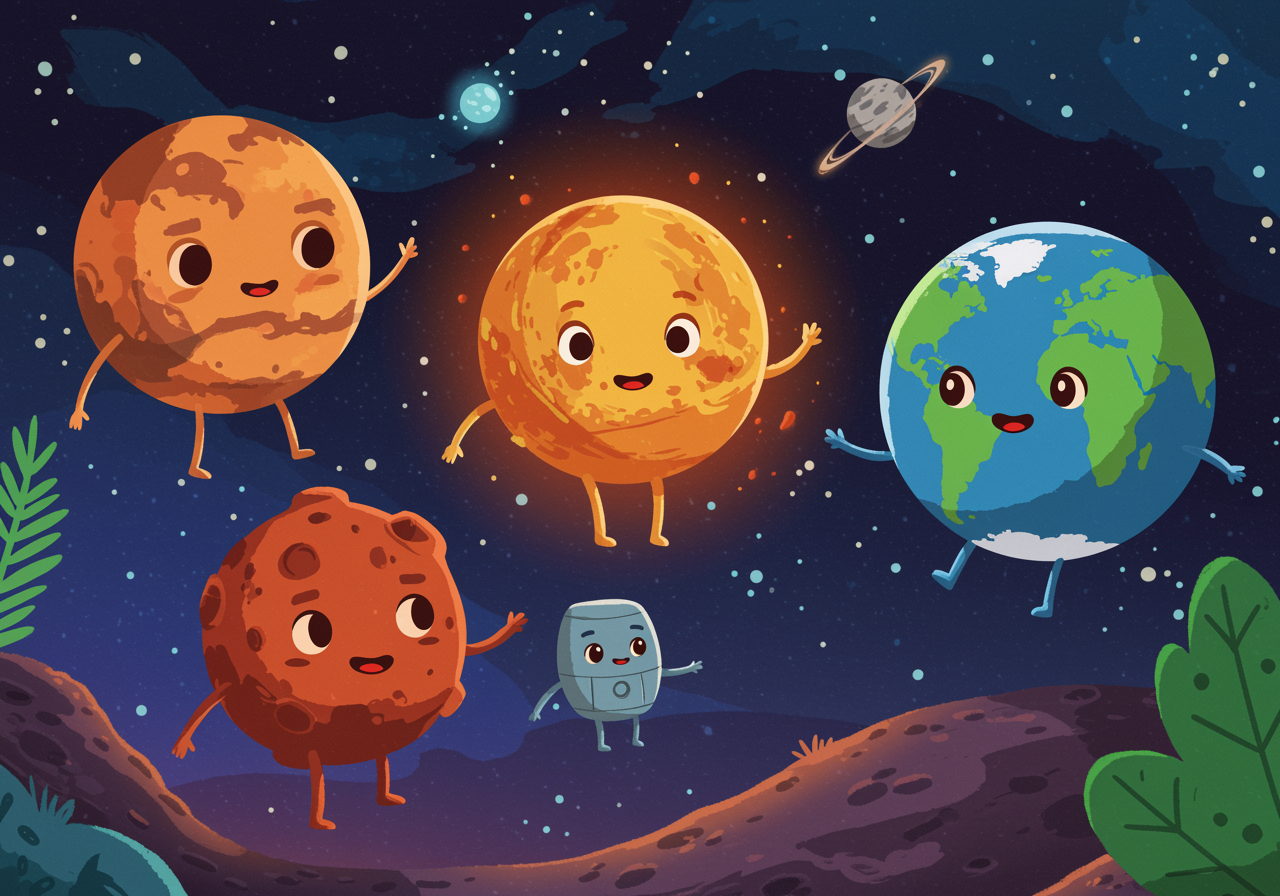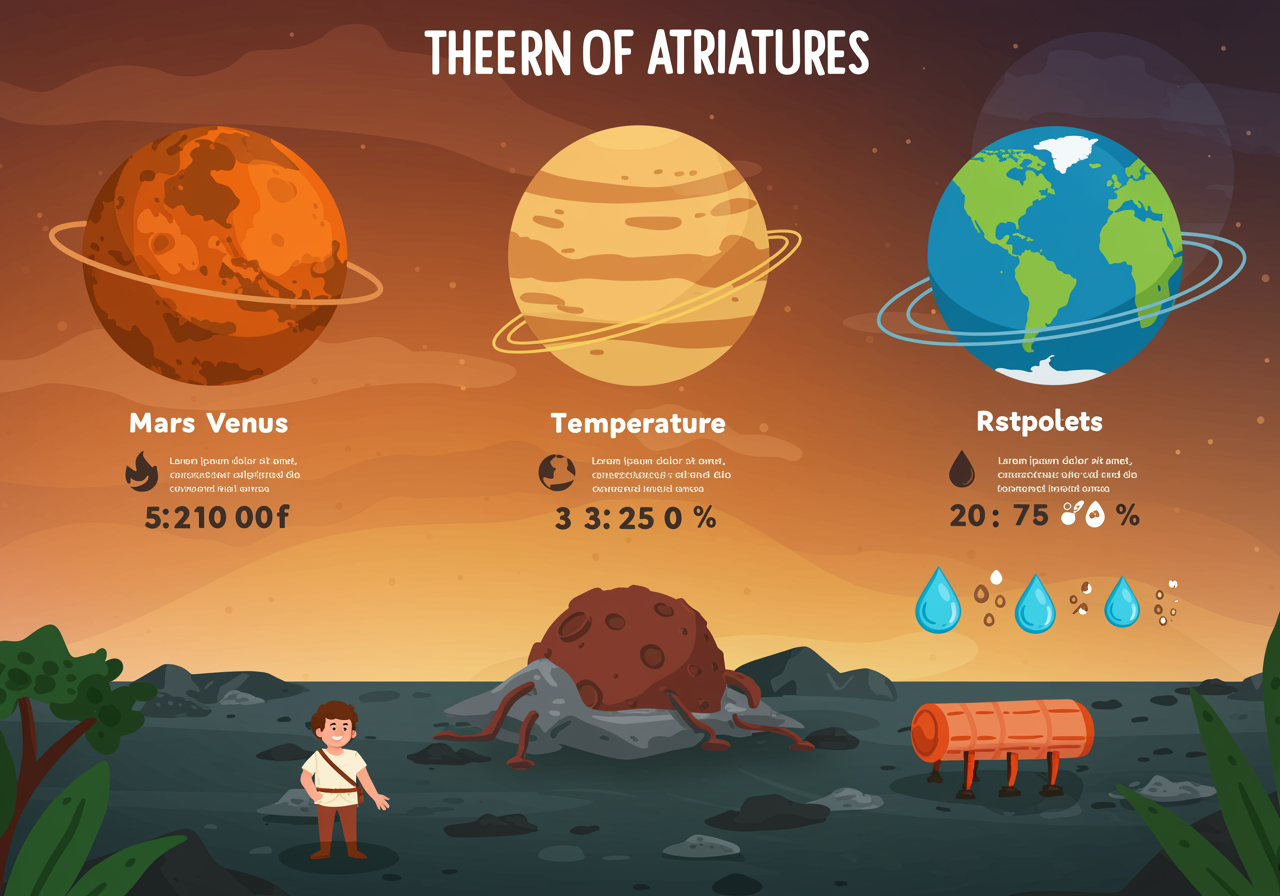Cosmic Detectives: How Other Planets Are Earth’s Best Teachers

Discover why studying Mars, Venus, and beyond helps us understand our amazing home planet
Ever wonder why scientists spend billions exploring other planets when we haven’t even figured out everything about Earth yet?
Overview
Think about how visiting your friend's house helps you notice things about your own home you never saw before. That's exactly what happens when we explore other planets! By studying Mars, Venus, Jupiter, and other worlds, scientists discover amazing secrets about Earth's weather, oceans, and even why life exists here. It's like having the ultimate comparison lab right in our cosmic backyard, and every mission teaches us something new about our own planet.

Understand in 30 Seconds
Get up to speed quickly
- Earth vs. Other Worlds: Comparing planets is like comparing different recipes – each ingredient (atmosphere, temperature, water) creates totally different results.
- Climate Clues Everywhere: Venus shows us what happens with too much greenhouse effect, while Mars reveals what happens when a planet loses its atmosphere.
- Life's Special Recipe: By studying dead or hostile planets, we understand exactly what makes Earth so perfectly suited for life.
- Future Problem Solving: Learning how other planets changed over time helps us predict and protect Earth's future climate.
Real Life Scenario
Situations you can relate to
Imagine you're trying to bake the perfect chocolate chip cookie, but you only have one oven and one recipe. How would you know if your temperature is right or if you need more flour? Now imagine you could peek into your neighbors' kitchens and see their cookie experiments – some burned, some too gooey, some just right. Suddenly you'd understand exactly what makes your recipe work! That's what scientists do with planets. Mars is like the 'burned cookie' – it lost its atmosphere and water. Venus is the 'overcooked' planet with crushing heat. And Earth? We're the 'just right' planet. But by studying our planetary neighbors' 'failed recipes,' we learn exactly what ingredients and conditions keep Earth perfect for life.

Role Play
Spark a conversation with “what if” scenarios
What if you were a planetary detective comparing crime scenes?
- Role play: Take turns being detectives examining 'evidence' from different planets (ice cubes for Mars, hot water for Venus, goldfish bowl for Earth) and deduce what happened to each world.
What if you were real estate agents trying to sell planets to alien families?
- Role play: Create sales pitches for different planets, highlighting their 'features' – you'll quickly realize why Earth gets five stars!
What if you were time travelers visiting Earth at different stages?
- Role play: Act out how Earth might have looked like Mars billions of years ago, and discuss what made the difference in their development.
FAQs
Frequently asked questions people want to know
Why don't we just study Earth directly instead of going to other planets?
It's like trying to understand all music by only listening to one song! Other planets show us different 'versions' of how planets can turn out, giving us the full picture.
How does studying Mars help with Earth's climate change?
Mars used to have water and a thicker atmosphere, but lost both. Understanding how and why helps us protect Earth's atmosphere and climate.
What's the coolest thing we've learned about Earth from other planets?
That Earth's magnetic field acts like a invisible shield protecting our atmosphere – something Mars lost, which led to its atmosphere escaping into space!
Examples in the Wild
See how this works day to day
- NASA's Perseverance rover found evidence that Mars once had rivers and lakes, helping scientists understand how Earth's water cycle could change over time (NASA JPL)
- The Parker Solar Probe studying the Sun helps us understand how solar wind affects planetary atmospheres, including Earth's protective magnetic field (NASA)
- ESA's Venus Express mission revealed how Venus's extreme greenhouse effect works, giving climate scientists better models for Earth's atmosphere (European Space Agency)
- Jupiter's Great Red Spot storm has been raging for centuries, teaching meteorologists about long-term weather patterns that could affect Earth (Space Telescope Science Institute)
In Summary
What you should know before you start
- Other planets are like Earth's 'what if' experiments showing us different possible outcomes
- Studying planetary atmospheres helps us understand and protect Earth's climate
- Mars and Venus show us how planets can lose their ability to support life
- Every space mission brings back knowledge that helps us take better care of our home planet
Pro-tip for Parents
You got this!
If your child asks 'Why spend money on space when Earth has problems,' flip the script! Explain that space exploration is like getting a check-up for Earth. Just as doctors compare your health to others to spot problems early, studying other planets helps us catch Earth's problems before they become serious. It's not about escaping Earth – it's about protecting it.

Keep an Eye Out For
Find these examples in everyday life
- News about Mars missions finding water evidence – great time to discuss Earth's water cycle
- Weather reports about extreme events – connect to what we've learned from studying Venus's extreme weather
- Northern Lights sightings – perfect opportunity to discuss Earth's magnetic field protection compared to Mars
Explore Beyond
Look up these related research topics
- How do we search for life on other planets and moons?
- What would it take to make Mars habitable for humans?
- How do scientists use telescopes to study planets around other stars?